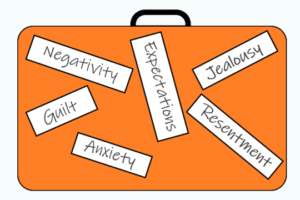In everyday communication, the words rationalization and justification are frequently used interchangeably. But, do they really mean the same thing?
Simply put, rationalization is an excuse, something that you say and/or do to protect yourself from emotional harm. Justification is a legal, medical or moral reason for your actions and/or behavior.
Opposing Perspectives
Perhaps looking at an event from two different perspectives can help illuminate the difference between rationalization and justification.
Event: You are driving on 1-45 heading toward exit 85. Your destination is Houston Healthcare Hospital. You are going 20 mph over the speed limit. You are stopped on the interstate by the police.
Rationalization: You tell the police officer you are afraid you will be late to work. Your alarm did not go off this morning. You had a fight with your significant other. You are hoping your excuses will be enough to prevent you from getting a speeding ticket. You are attempting to protect yourself from emotional (and financial!) harm.
Justification: You tell the police officer that the woman in the passenger seat is in labor with contractions 2 minutes apart. Your goal is to get the pregnant woman to the hospital before the baby is delivered in your car! You feel there is a medical reason (having the baby delivered in the hospital, not your car!) for your speeding, and you should be excused from a speeding ticket for this medical situation.
All of the reasons given are real reasons for speeding. You did have a fight. You are afraid you will be late for work. The woman is about to deliver her baby. It is all a matter of perspective in determining if the reason for speeding is deemed legitimate to the police officer so you can avoid a speeding ticket.
Rationalization
Rationalization is telling yourself it is “okay” to eat a chocolate frosted brownie because you walked 10,000 steps yesterday. Rationalization is saying it is “okay” you cheated on your significant other because s/he wasn’t paying enough attention to you. Rationalization is saying it is “okay” to drive 15 mph over the speed limit because everyone else is driving that fast, too.
Rationalization is a defense mechanism. It is something you say or do to protect yourself from emotional harm. Rationalization is a fairly common defense mechanism, something many people may do without even realizing they are doing it.
It can be difficult for people to notice when they rationalize, because it feels better to believe their excuses than admit they caused a problem. Maybe an individual didn’t follow through on a commitment, so instead points out what s/he did: “I didn’t get to the dishes, but I worked hard at the office.” Or maybe you claim your behavior could have been worse: “I don’t change diapers, but I am better than my dad, who was never around.”
Rationalization is not always harmful, especially when used in simple life situations, for example, “I am in a bad mood because of traffic” or “I didn’t clean the litter box because I was busy making supper.” While they are examples of rationalization, in the scheme of life, these are not excuses you will be judged for by others.
Rationalizing an event may help individuals maintain self-respect or even avoid guilt over something they have done. Problems arise when rationalization is continuous. It then can become maladaptive and even dangerous.
How can you recognize rationalization? Check for:
- Blaming
for example, “The problem is the people around me. I hire badly.” - Minimizing
for example, “It’s really not such a big deal” - Deflecting
for example, “That’s not the real issue” - Attacking
for example, “I may have done X but you did Y”. Also see my blog on Content to Process Shift.
Justification
Justification is saying it is legally acceptable to physically punch someone if they hit you first. In Canada, justification is saying medical assistance in dying (MAID) is medically acceptable even if you do not have a fatal or terminal condition.
Justification is saying it is morally acceptable for property to be damaged and/or destroyed when gaining attention for a higher cause. Why Damaging Property Isn’t The Same As Violence by Nathan J. Robinson June 01, 2020
Justification is the act of explaining the logical, rational reason why you made a decision or took an action. Justification is the reason for your behavior. It is important to be able to provide the justification for your actions when they are only ethical under certain circumstances. For example, the Castle Law. If someone breaks into your home with the intent of harming you or your family, you have the legal right to protect yourself. Even if this includes killing the intruder. While you should ALWAYS check the laws in your particular jurisdiction and state, many consider killing an intruder who has entered your home with the intent of harm is considered legal justification for the killing. However, to be clear, this is not the law of the land, and your jurisdiction or state may not have a Castle Law.
Blurred Lines
The reason people tend to confuse the actions of rationalization and justification is that the lines are constantly being blurred and changed. This can be emotionally damaging. You can possibly make yourself feel better in the moment but either regret it later or face social consequences when others viewing your act know that it’s actually wrong.
Clearly it is wrong to physically or emotionally harm anyone. It has always has been wrong. What has changed is where the line is drawn between protecting yourself from emotional harm (rationalization) and creating a legal, medical or moral reason (justification) for your behavior. More and more people are deeming it acceptable to physically harm someone who disagrees with them politically. This rationalization might not be new, but the degree to which it is being used is unprecedented.
The following are examples of the current level of rationalization in action:
- I have a right not to be offended.
- I can respond to speech that I don’t like with violence.
- Speech that I disagree with is wrong.
- Speech that is wrong and that offends me is hateful.
- Speech that is hateful is violence.
It is almost like people are starting to make up their own rules about what is morally, medically and legally right! And then imposing their rationale on others.
Take Away Point
People frequently interchange the words rationalization and justification. While they can occur simultaneously, they are very different. Accurately describing which you are feeling is important in managing your emotions and obtaining support if you need it.
Thank you so much for reading this blog. If you enjoyed the content, please check out other blogs at:
https://relationshipsrelearned.com/my-blog/
https://rvingnomads.com/blog/
You can view my available books on my Amazon Authors Page.
To be notified of future posts, please enter your email address and click on the Subscribe button.













